Therapy Digital Marketing
Marketing Tips for Therapists
We keep updated on the latest marketing trends for therapists. This includes search ads, social media, email marketing, lead generation, CRO, and more!
Digital Marketing Services
Website Marketing Solutions for Therapy Clinics
Digital marketing for therapists is the process of advertising through online channels like websites, search engines, social media, email, or apps to prospective therapists.
Many therapists think digital marketing is just another term for SEO or PPC advertising. Even though both services are used for internet marketing, neither fully describes the depth of complete internet advertising plans for therapy clinics.
Today's online advertising campaigns often include dozens of tactics, all working in tandem to help your therapy clinic improve visibility and conversions.
Let's talk about what our internet marketers have seen help people in this industry!






50+ Digital Marketing Tactics for Therapists
We are a team of internet marketing specialists with diverse knowledge and experience in the latest online marketing trends for therapists.
For years, our team has assisted therapists with their digital marketing goals. The strategies / tactics discussed in this section can help with online advertising for therapists and even:
- Marriage And Family Therapists
- Mental Health Counselors
- Social Workers
- Substance Abuse Counselors
- Art Therapists
- Music Therapists
- Dance/movement Therapists
- Occupational Therapists
- Speech Therapists
- Sex Therapists
- Trauma Therapists
- Grief Counseling Services
- ...and more!
A Few of Our Digital Marketing Experts






1.) Lead Generation for Therapists
Lead generation is a crucial digital marketing strategy for therapists, helping them attract potential clients and grow their practice. By implementing effective lead generation techniques, therapists can increase their chances of connecting with individuals who are actively seeking therapy services. Here are several tailored examples to help therapists generate more leads:
- Create a Free Downloadable Resource: Develop a valuable resource such as an e-book or a guide that addresses common mental health concerns. Offer it as a free download on your website in exchange for visitors' contact information.
- Offer a Free Consultation: Provide a complimentary initial consultation session where prospective clients can discuss their needs and learn about your therapeutic approach. Advertise this offer on your website and social media platforms to encourage lead generation.
- Host a Webinar: Organize a webinar on a relevant mental health topic and invite interested individuals to register. Use this opportunity to showcase your expertise and collect contact information from attendees who want to learn more about your services.
- Create Engaging Video Content: Produce short videos where you share helpful insights, practical tips, or answer common therapy-related questions. Share these videos on social media platforms to engage with your target audience and direct them to your website or contact form.
- Participate in Online Communities: Join online forums, social media groups, or professional networks related to mental health and therapy. Engage in conversations, offer valuable advice, and discreetly mention your services when appropriate to pique interest and generate leads.
- Optimize Your Website for Local SEO: Utilize search engine optimization techniques to improve your website's visibility in local search results. Include relevant keywords, create location-specific landing pages, and ensure your contact information is easily accessible to attract leads within your geographic area.
- Collaborate with Influencers: Identify influential bloggers, podcasters, or social media personalities who align with your therapeutic niche. Explore opportunities for guest appearances, sponsored content, or cross-promotion to expand your reach and generate leads from their dedicated audience.
- Offer Online Workshops: Develop online workshops or group therapy sessions focused on specific topics, such as stress management or relationship building. Promote these workshops through targeted advertising and email campaigns to capture leads interested in your specialized offerings.
- Implement Live Chat on Your Website: Install a live chat feature on your website to engage with visitors in real-time. Use this opportunity to address their questions, provide immediate support, and gather contact information from potential leads seeking therapy services.
- Launch a Referral Program: Encourage your existing clients to refer their friends, family, or colleagues to your practice. Implement a referral program that rewards both the referrer and the new client, motivating your current clients to actively generate leads on your behalf.
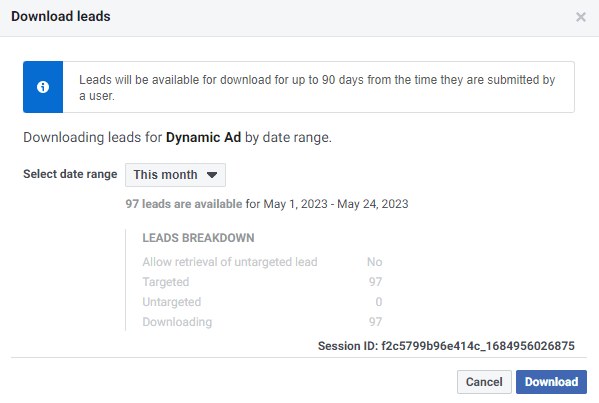
2.) Social Advertising for Therapists
As a therapist, social advertising can be a powerful digital marketing strategy to connect with potential clients and expand your therapy practice. Here are five examples of how social advertising can help your therapy business:
- Targeted Demographic Outreach: Utilize social media ads to reach a specific demographic that may benefit from your therapy services. For instance, you can target ads towards individuals experiencing stress or anxiety, new parents seeking support, or those going through life transitions.
- Highlight Specializations: Showcase your therapy specializations through social media ads. For example, if you specialize in cognitive-behavioral therapy (CBT) or trauma therapy, create ads that emphasize your expertise in those areas to attract clients seeking those specific services.
- Offer Free Consultations: Run ads promoting free initial consultations. This can encourage potential clients to take the first step in seeking therapy by providing them with an opportunity to discuss their needs and goals with you without financial commitment.
- Share Educational Content: Create social media ads that link to valuable educational content related to mental health and well-being. By sharing informative articles, videos, or infographics, you can position yourself as a trusted authority in the field and build brand awareness.
- Engage in Webinars or Workshops: Advertise webinars or workshops on mental health topics that you'll be hosting. Social ads can help you attract participants interested in learning more about specific subjects and potentially converting them into clients.
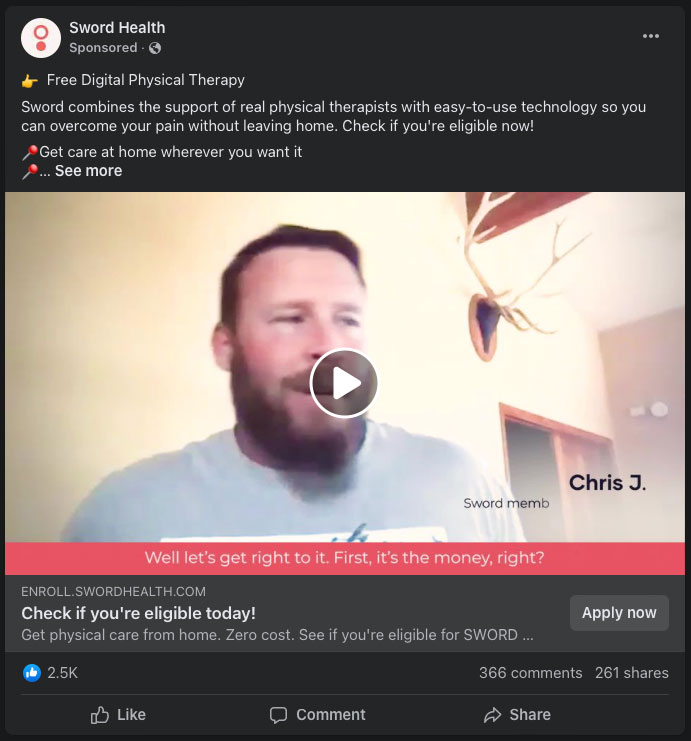
3.) Conversion Rate Optimization (CRO) for Therapists
Conversion rate optimization is a valuable digital marketing strategy that can help therapists enhance their online presence and attract more clients. By optimizing your website and paid advertising, you can increase the number of visitors who take action, such as scheduling an appointment or contacting you for more information. Here are some examples of how CRO can benefit your therapy practice:
- Clear Call-to-Action (CTA): Place prominent and compelling CTAs on your website, urging visitors to take the desired action, such as "Book a Session Now" or "Contact Me for Consultation." A clear and visible CTA can lead to higher conversion rates as it guides visitors towards scheduling an appointment.
- Testimonials and Success Stories: Showcase positive testimonials and success stories from your satisfied clients. Potential clients often seek reassurance and validation from others who have benefited from your therapy services, leading to increased trust and conversions.
- Informative Blog Content: Create a blog section on your website where you regularly publish informative articles related to mental health, therapy techniques, and wellness. Providing valuable content can position you as an authority in your field and attract potential clients who are seeking answers to their questions.
- Personalized Landing Pages: Design specific landing pages for different therapy services you offer. Tailor the content and imagery to resonate with visitors looking for a particular type of therapy. Personalization can improve engagement and conversions as potential clients feel understood and supported.
- Easy Contact Forms: Streamline the process of reaching out to you by incorporating user-friendly contact forms on your website. Keep the form fields simple and ask for essential information only. This reduces friction and encourages visitors to reach out for more information or book a session.
- Online Scheduling and Availability: Offer an online scheduling system that allows potential clients to book appointments directly from your website. Display your availability clearly and provide options for rescheduling or canceling appointments. Easy scheduling can lead to more conversions as it eliminates unnecessary barriers.
- Live Chat Support: Implement a live chat feature on your website to provide instant support to visitors who have questions or need assistance. Prompt responses can create a positive impression and encourage visitors to take the next step, such as booking an initial consultation.
- Responsive Website Design: Ensure your website is optimized for all devices, including desktops, tablets, and smartphones. A responsive design ensures a seamless user experience, which can lead to increased engagement and conversions.
- Email Newsletters: Offer a sign-up option for an email newsletter to keep potential clients informed about your services, upcoming workshops, and mental health tips. Regular newsletters can nurture leads and eventually lead to conversions as they stay connected with your therapy practice.
- Localized SEO: Optimize your website for local search by including location-based keywords and creating a Google My Business profile. This will help potential clients in your area find you more easily, leading to increased inquiries and conversions.
4.) Sales Funnels for Therapists
As a therapist, implementing sales funnels into your digital marketing strategy can help you attract potential clients, build trust, and ultimately convert leads into booked appointments. Sales funnels allow you to connect with individuals seeking mental health support and guide them through a personalized journey to becoming your valued clients. Here are 5 examples of how sales funnels can benefit your therapy practice:
- Lead Magnet Funnel: Offer a free downloadable resource, such as a guide or e-book, on your website that provides valuable insights or coping strategies related to mental health topics. Use social media and email marketing to promote the lead magnet. When visitors opt-in to receive the resource, collect their email addresses and send a series of nurturing emails that offer additional support and eventually invite them to schedule a consultation or appointment.
- Webinar Funnel: Host a live or pre-recorded webinar on a specific mental health topic that interests your target audience. Promote the webinar through social media and email campaigns. Create a dedicated landing page where visitors can register for the webinar. During the webinar, provide valuable information and showcase your expertise. After the webinar, follow up with attendees through email to offer a special discounted consultation session, encouraging them to take the next step and engage in therapy.
- Client Testimonial Funnel: Share success stories and testimonials from your previous clients through video, written content, or case studies. Use social media and email marketing to promote these testimonials and drive traffic to a dedicated landing page that highlights the positive outcomes of your therapy services. After potential clients view the testimonials, send follow-up emails that offer a free consultation or assessment, demonstrating your dedication to helping them achieve similar results.
- Self-Care Challenge Funnel: Create a self-care challenge that lasts for a specific duration, such as 7 or 14 days. Promote the challenge on social media and through email campaigns. Develop a landing page where participants can sign up and receive daily self-care tips or activities. Throughout the challenge, engage with participants through emails and provide encouraging messages. At the end of the challenge, offer a discounted introductory therapy session to those who participated, showcasing the value of ongoing mental health support.
- Workshop Funnel: Host a live or online workshop on a particular mental health topic that resonates with your target audience. Promote the workshop through social media and email marketing. Create a landing page where attendees can register for the workshop. During the workshop, provide valuable insights and practical tips. After the workshop, follow up with participants through email to offer a package deal on future therapy sessions, encouraging them to continue their journey towards personal growth and healing.
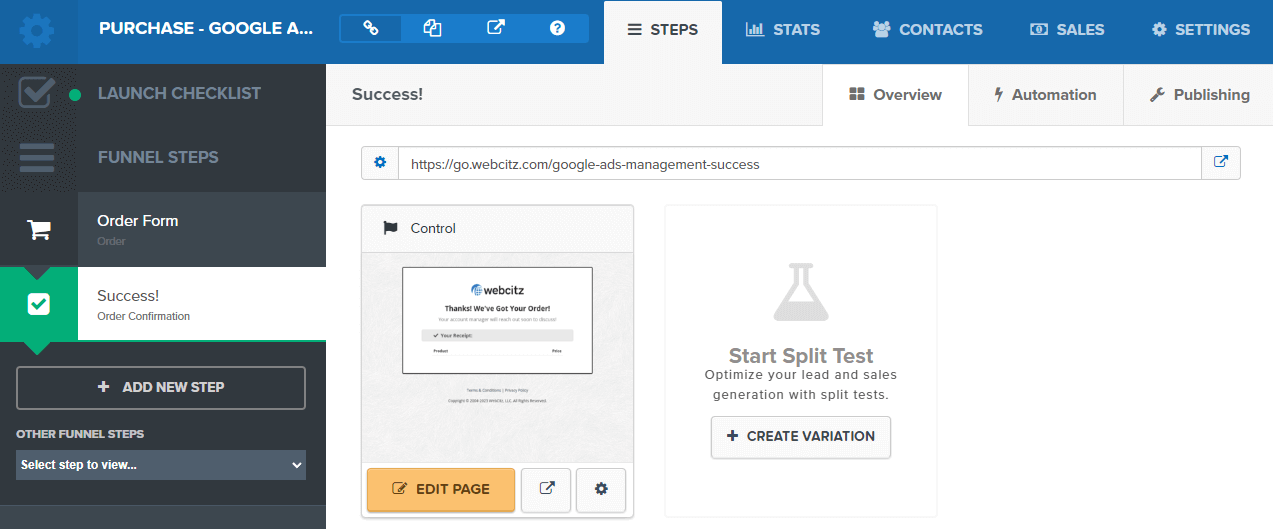
5.) Email Marketing for Therapists
As a therapist, email marketing can be a powerful digital marketing strategy to connect with your clients, build trust, and provide valuable content that supports their well-being. It allows you to maintain regular communication with your clients, offer helpful resources, and promote your therapy services. Here are six examples of how email marketing can benefit your therapy practice:
- Insightful Newsletters: Send out informative and insightful newsletters to your email subscribers on a regular basis. Share articles, blog posts, or videos related to mental health, personal development, and well-being. Offering valuable content can position you as an expert in your field and keep your clients engaged with your practice.
- Self-Care Tips: Send personalized self-care tips and strategies to your clients via email. Tailor the tips to specific client needs based on their previous sessions or interests. Providing self-care guidance can empower your clients to take proactive steps in their well-being and reinforce the benefits of therapy.
- Session Follow-ups: Follow up with clients after therapy sessions through email. Express your appreciation for their trust and participation in the session, and provide any additional resources or exercises discussed during the session. This follow-up email can reinforce the progress made and encourage clients to continue their therapeutic journey with you.
- Workshop Invitations: Organize workshops or webinars on specific mental health topics and invite your email subscribers to attend. Use email marketing to send personalized invitations, highlighting the relevance of the workshop to their interests or challenges. Workshops can help clients deepen their understanding and foster a sense of community among your clients.
- Testimonials and Success Stories: Share success stories and testimonials from your clients in your email campaigns. Feature their experiences, insights, and the positive impact therapy has had on their lives. Real-life stories can build trust and comfort for potential clients who may be considering therapy but are unsure about taking the first step.
- Referral Programs: Implement a referral program and promote it through email marketing. Encourage satisfied clients to refer their friends, family, or colleagues to your therapy practice. Incentivize referrals with rewards such as discounted sessions or additional resources. A well-executed referral program can help you expand your client base and reach new potential clients.
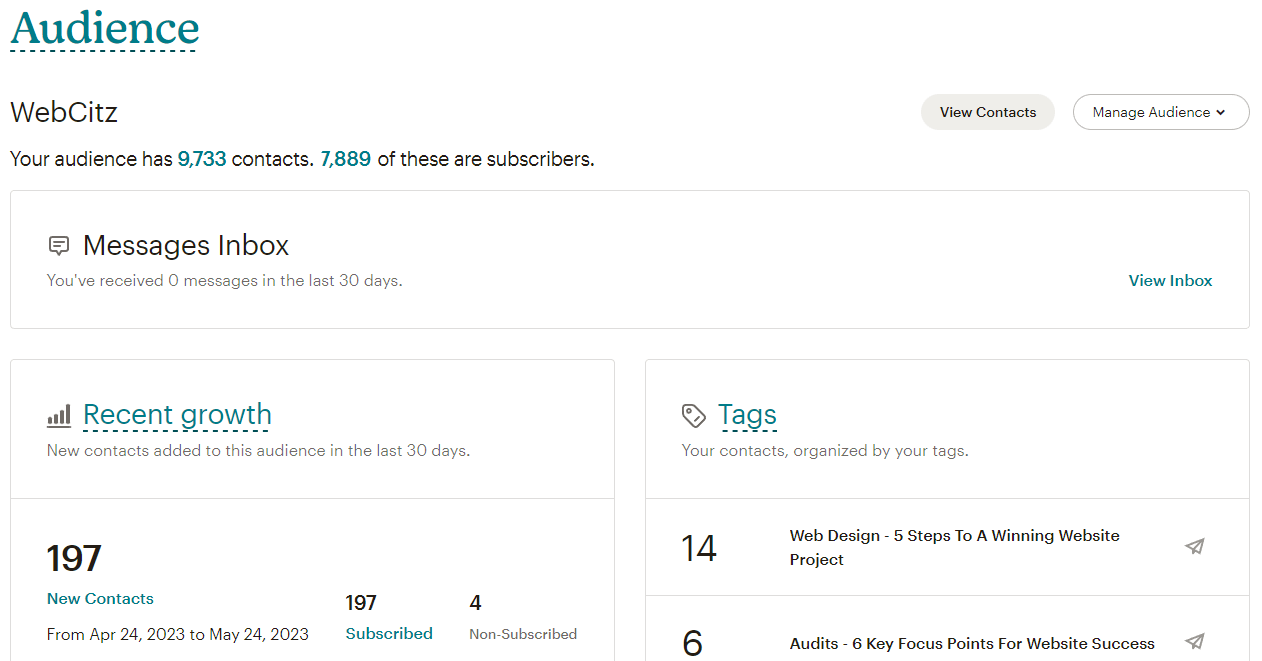
6.) Search Advertising for Therapists
As a therapist, you provide valuable mental health services to individuals in need. To reach more potential clients and grow your practice, consider search advertising as a powerful digital marketing strategy. Search advertising allows you to connect with individuals actively searching for therapy services, ensuring your practice appears prominently in relevant search results. Here are five examples of how search advertising can help your therapy practice:
- Individual Therapy Services: Use search ads with keywords like "therapist near me" or "individual counseling services." This strategy targets individuals seeking therapy for personal challenges, helping you attract new clients seeking one-on-one counseling sessions.
- Online Therapy Options: Create search ads for keywords like "online therapy sessions" or "virtual counseling services." This strategy appeals to individuals looking for remote counseling options, showcasing your practice's ability to provide therapy services through virtual platforms.
- Specialized Therapy Expertise: Utilize search ads targeting keywords like "trauma therapist" or "anxiety counseling specialist." This strategy allows you to reach individuals searching for specific therapy expertise, highlighting your practice's specialization in addressing particular mental health concerns.
- Marriage and Couples Counseling: Run search ads for keywords like "marriage counseling" or "couples therapy near me." This strategy helps you attract couples seeking counseling services, showcasing your practice as a resource for relationship and communication improvement.
- Stress Management and Coping Skills: Create search ads targeting keywords like "stress management techniques" or "coping skills therapist." This strategy appeals to individuals seeking guidance on managing stress and developing healthy coping mechanisms, positioning your practice as a source of support for emotional well-being.
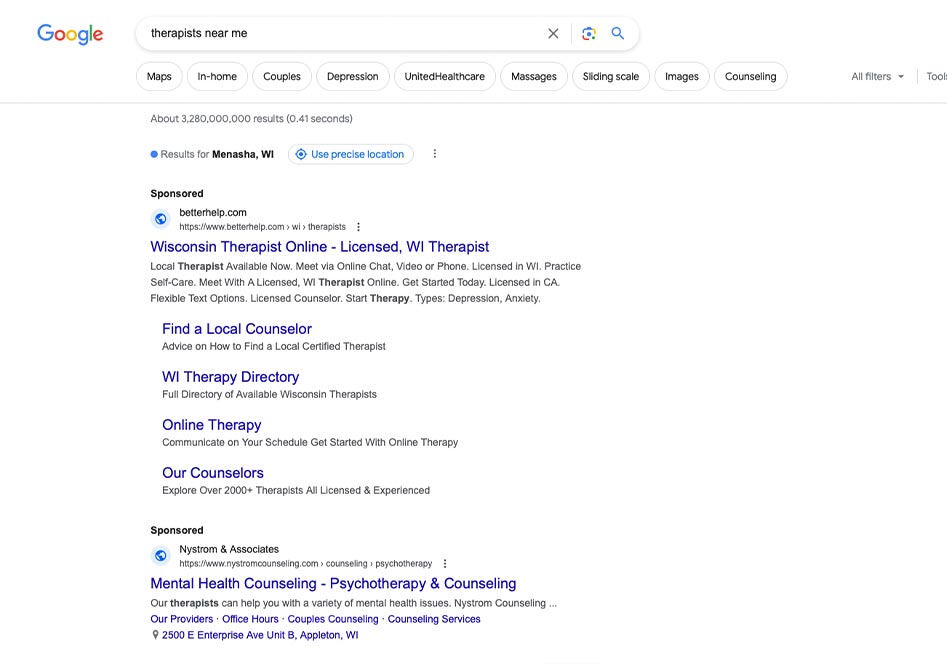
7.) Content Marketing for Therapists
As a therapist, content marketing can be a powerful digital marketing strategy to showcase your expertise, build trust with potential clients, and attract individuals seeking support and guidance. By creating valuable and relevant content, you can establish yourself as a knowledgeable and compassionate therapist, reach a wider audience, and ultimately grow your practice. Here are five examples of how content marketing can benefit your therapy business:
- Mental Health Blog: Start a blog where you share informative and educational articles related to mental health and therapy. Write about various topics such as coping strategies, self-care techniques, and ways to manage stress and anxiety. By providing valuable content, you can position yourself as a trusted resource for individuals seeking mental health support.
- Video Q&A Sessions: Host video Q&A sessions on social media or your website, where you address common mental health questions and concerns. Use these sessions to provide insights into therapeutic techniques and share practical advice. By engaging with your audience in real-time, you can demonstrate your expertise and build rapport with potential clients.
- Client Success Stories: Share anonymized client success stories that highlight the positive outcomes of therapy. Focus on the challenges clients faced, the therapeutic journey, and the positive changes they experienced. These stories can inspire others to seek therapy and demonstrate the potential benefits of working with you.
- Guided Meditation and Relaxation Recordings: Create and share audio recordings of guided meditation and relaxation exercises. These recordings can serve as a valuable resource for individuals looking for stress-relief techniques and can also showcase your therapeutic approach and style.
- Therapy Resource Library: Create a resource library on your website that offers downloadable guides, worksheets, and self-help materials. Cover topics such as mindfulness practices, communication skills, and emotional regulation. By providing free resources, you can establish your credibility and attract individuals who may later seek your services for more personalized support.

8.) Reputation Management for Therapists
As a therapist, reputation management is a vital digital marketing strategy that can significantly impact your practice. In the mental health and wellness field, building and maintaining a positive online reputation is crucial for attracting new clients and establishing trust with existing ones. Here are five examples of how reputation management can help your therapy practice:
- Collect and Showcase Client Testimonials: Request feedback from your clients about their therapy experience and seek permission to use their testimonials on your website and social media. Positive reviews and personal success stories can demonstrate the effectiveness of your therapy sessions and instill confidence in potential clients.
- Create Informative Content on Mental Health: Establish yourself as a thought leader in the mental health industry by creating informative and helpful content. Write blog posts, create videos, or host webinars that provide valuable insights into mental health topics, coping mechanisms, or self-care strategies. Sharing valuable content can position you as an expert and attract a wider audience.
- Engage and Respond to Online Reviews: Monitor online reviews and respond to them professionally and compassionately. Address any concerns or issues raised by clients and express your appreciation for positive feedback. By engaging with reviews, you show that you value your clients' opinions and are committed to their well-being.
- Offer Virtual Therapy Sessions: Embrace the power of technology and offer virtual therapy sessions for clients who may prefer remote counseling. Publicize your telehealth services and make it easy for clients to book virtual appointments. Providing flexible and accessible options can attract new clients from different locations.
- Utilize Social Media for Mental Health Advocacy: Use social media to advocate for mental health awareness and share inspirational messages. Create a supportive online community where clients and followers can interact, share their experiences, and seek support. Being actively involved in mental health advocacy can enhance your reputation as a caring and empathetic therapist.
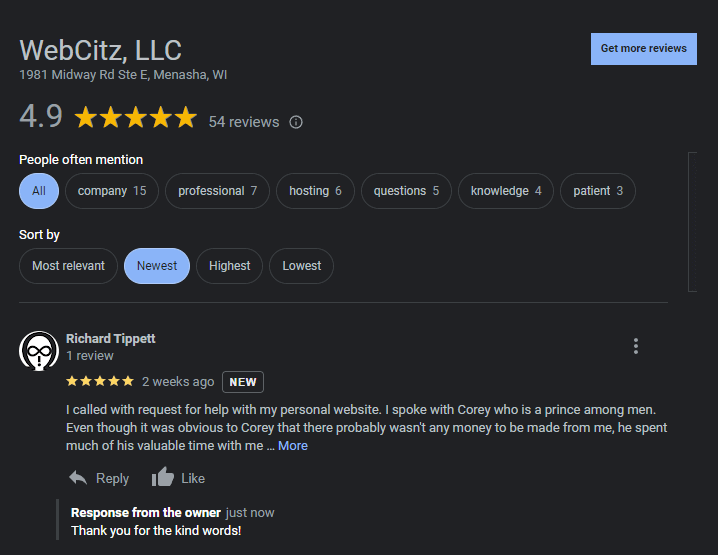
9.) Video Marketing for Therapists
As a therapist, video marketing can be a valuable digital strategy to connect with potential clients, showcase your expertise, and provide valuable content that resonates with your audience. Video content allows you to communicate your message effectively and establish a strong online presence. Here are five examples of how video marketing can help your therapy business:
- Introduction and Welcome: Create a warm and inviting video introducing yourself and your therapy practice. This video can help potential clients get to know you on a personal level, understand your approach to therapy, and feel more comfortable reaching out to schedule an appointment.
- Therapy Approach and Techniques: Produce videos that explain your therapy approach and the techniques you use in your sessions. This can help potential clients understand how you can help them, what to expect during therapy, and the potential benefits of your services.
- Mental Health Tips: Share short video clips offering helpful mental health tips and coping strategies. These videos can address common mental health challenges, such as stress management, anxiety reduction, and improving self-esteem. Providing valuable content can position you as a trusted resource and attract clients seeking support.
- Client Success Stories: With the consent of your clients, create video testimonials or success stories that highlight how therapy has positively impacted their lives. Hearing real-life experiences from others can inspire hope and encourage potential clients to seek your services.
- Live Q&A Sessions: Host live video Q&A sessions where you answer questions from your audience about mental health, therapy, and related topics. This interactive format allows you to engage directly with viewers, build rapport, and demonstrate your expertise in real-time.






![Ecommerce Digital Marketing Strategy [+37 Can’t Miss Strategies] Image](https://www.webcitz.com/blog/wp-content/uploads/2022/10/37-cant-miss-strategies.jpg)